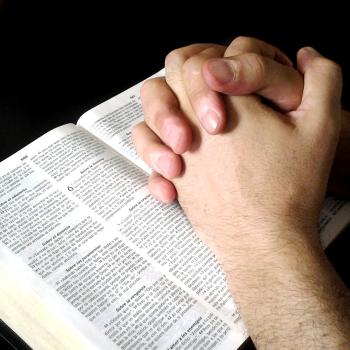When Church and State partner up, they often produce really ugly offspring.

Image via Pixabay
Depending on what kind of Christ-follower you are (or if you are one at all), the views on the partnership between Church and State can vary wildly.
I grew up in the Pentecostal church, and there was very much a belief amongst many (not all) in the Pentecostal/Charismatic wing of Christianity that our job was to “take back” the government, to get believers elected, and to get Christian morality written into law. In some extremes, it was even believed that once this happened, it would be the trigger point for Jesus to return.
In the Anabaptist stream of the Church, where I swim presently, it has generally been believed that Church and State intertwining is a really bad idea. Before the days of the Protestant Reformation (which was where Anabaptism was born), the Catholic Church was incredibly influential and in some cases, very much in control of the governments of many Western nations, and then as Protestantism arose, some nations began to ally their government and policies with Protestantism instead.
Anabaptists, on the other hand, elected to stay out of secular politics for the most part. As they always seek to do, they went to the Scriptures, and specifically to the life and teachings of Jesus.
And while one might make a biblical argument that Israel stands as an example of where faith and government come together to rule, the early Anabaptists determined that the Church is not the same as Israel – in fact, it is not like a nation-state at all. The Church was meant to be a movement that went beyond any state or any government, breaking down such walls and barriers in the Name of Jesus.
Therefore, the rules that applied to the nation-state of Israel do not automatically apply to the Church of Jesus Christ, since we are a different organization and are under a new and different contract with God than Israel was, even if we are all collectively part of God’s people (e.g. Lk 22.20; Rom 7.1-6; Heb 8.7-13).
Anabaptists looked at Christ and at the early Church and could find no biblical example of where it was ever taught or modelled that Christians should take over the government or that this was the main way that God wanted to bless the world. If it was, then why didn’t Jesus just head to Rome and take over everything from there?
Instead, Anabaptists always viewed the Jesus movement as a grassroots movement, not a worldly power-seeking movement. Jesus taught us to humble ourselves, to serve, to take last place (Mt 23.8-12; Lk 14.7-11). Let the world seek power and position, Jesus said – you who follow Me will lower yourself in service of others instead (Lk 22.24-26). Christ-followers don’t seek to elevate themselves into traditional power structures, but rather, they follow the example of Christ in moving in the opposite direction (Phil 2.3-11).
Attempting to rule from a top-down secular government authority structure, forcing others to obey God whether they like it or not, is not something that Jesus teaches or models for us at all – quite the opposite. He ministered person-by-person, group-by-group, no doubt knowing that forcing people into obedience can never be true obedience – change needs to happen, but people need to desire it, and cannot be coerced into it.
Even God’s Law was not enough on its own to save us, or to change us or the world (Rom 3.20; 8.3); if this is the case, then why would we expect that man’s law or man’s government could do any better?
What is more, the real-life examples of what happens when Church and State get together are often horrifying.
When Christian goals and State goals start to merge together, the hope of course would be that the light of the Christians would push back the darkness of the worldly State.
But in real-life practice, the opposite has tended to be true.
When the Church gets caught up in the politics and power and wealth of the world, she inevitably needs to compromise her values in order to maintain the State’s support. Since the State is “of the world,” and lives by the ways of the world, when the Church yokes herself to the State, she ends up taking on worldly ways more often than not, laying aside the ways of Christ as she does so.
Thus, the separation of Church and State is actually a good thing – to protect the Church and keep her pure.
As a few examples, here are some things that various governments over the past 2,000 years have done in the Name of Jesus, with the Church driving the actions:
- Launched bloody Crusades to take back land from Muslims which resulted in the deaths of thousands of innocents, slaughtered by the Christians
- Declared war on fellow Christians who believed differently than they do, killing one another by the thousands
- Tortured and executed people who they felt were heretics
- Threatened Jewish and Muslim people with consequences, including exile and death, if they did not forcibly convert to Christianity
- Taken massive amounts of money from the common people through taxes and levies and poured it into churches, cathedrals, land, positions, and power structures for the Church
- Burned and hung women who were accused of being witches, often on the flimsiest of pretenses
- Justified slavery and human trafficking and encouraged it as a part of God’s design for humanity
- Forcibly removed Indigenous children from their families and placed them in residential schools in an attempt to force them to accept Jesus and learn the “civilized” ways of white people
- Written laws based on Christian religion and forced them on the population for their obedience, whether they were Christian or not
- Turned the sacredness of prayer into a mindless chant that all are forced to participate in, whether believers or not, in places like schools and public gatherings.
Again, when Church and State partner up, they often produce really ugly offspring.
And of course, most if not all of these actions look wild when compared to the life and teachings of Jesus! The one who taught us to “love your enemy” (Mt 5.43-45) could not possibly support such enemy-slaughtering violence. The one who lived a life of poverty and warned about the dangers of wealth (Mt 6.19-24; Lk 9.58; 2Co 8.9) could not possibly have been behind building incredible earthly wealth for the clergy and the Church on the backs of the poor. The one who called and invited but never forced anyone to follow Him (Mt 22.1-14; 23.37) surely could not endorse coercing people into a mandated obedience, whether they wanted to or not.
It seems that when Church and State partner together, the Church often forgets who she is, and who her Saviour is and what He taught. The politics and power of the State eventually and inevitably cause the Church to move away from the ways of Christ and to move into the ways of the world.
But what of the abolition of slavery in England and America, something that churches helped accomplish? What about women’s rights, and health care, and other justice issues, where Christians at times have worked with government, and good things have happened?
In some ways those are decent counter-examples, and yet in each of those cases, it was also not exactly a case of the Church partnering with the government to force change upon the general population. They all happened in democracies where the Church advocated for the cause, and helped to educate and shift public opinion to the point where enough people were ready for the change that the government felt politically safe to act upon it.
And this certainly can be a great place for us to act today. The Church can and should be a clear and biblical voice to our government and our culture. This is where Anabaptists have often fallen short; in the desire to avoid political entanglements, they at times have withdrawn from the world to the point where their biblical voice has been silenced. We should let our light shine in many ways and many areas, and we should be faithful to our calling to share the Word of God, as long as we understand that worldly government and laws and policies are ultimately not our hope and are ultimately not our solution.
God may indeed use these things, but He does not need them, and neither do we.
Ultimately, the way of Christ is not the way of force or coercion, and it is not about outside pressure or outward obedience. It is about inward change, a “born-again” view of everything that causes us to desire the things of God and pursue them (Jn 3.5-8; 1Co 2.14).
We can pray, proclaim, teach, influence, and advocate for justice without compromising ourselves with worldly power. If we are going to call ourselves Christians, we must walk in the ways of Christ, always (1Jn 2.6), and if we find ourselves drifting from His ways into compromise with the worldly avenues of power, then we must question why and find our way back to His path again.
Anabaptist have always valued the separation of Church and State. The Church has been given a task by God, and the State has been giving a different task by God, and each should do their job, for His purposes and ultimately for His glory. To expect or pursue more is go beyond the teaching and example of Jesus, and once we start doing that, the fruit of the actions speak for themselves.
********
If you’re enjoying what you read, you can follow Third Way Christians on Facebook or Instagram, or sign up to get new columns emailed to you here! As well, you can track along with Chris’ church teaching at Meadow Brook Church’s YouTube page!












